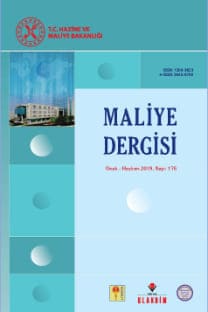Avrupa birliği ülkeleri ve Türkiye’de Ar-Ge faaliyetlerine yönelik vergi teşvikleri ve bunların karşılaştırmalı analizi
Piyasa başarısızlığı nedeniyle eksik kalan Ar-Ge yatırımlarını teşvik etmek amacıyla devletler bazı teşvik araçları kullanırlar. Bunlardan birisi de vergi teşvikleridir. Pek çok Avrupa Birliği (AB) ülkesinde de Ar-Ge vergi teşvikleri uygulanmaktadır. Ar-Ge vergi teşvikleri; Vergi Ertelemeleri, Vergi İndirimleri, Vergi Kredileri ve Genişletilmiş Teşvik araçlarından oluşmaktadır. AB ülkelerinin çoğunda Ar-Ge vergi teşvik sisteminin Kurumlar Vergisi üzerine kurulduğu ve teşvik mekanizması olarak da daha ziyade vergi kredileri ve vergi indirimlerinin kullanıldığı görülmektedir. AB’nin aday ülkesi konumunda olan Türkiye son yıllarda yaptığı düzenlemelerle Ar-Ge faaliyetlerine yönelik önemli sayılabilecek vergisel teşvikler sağlamıştır. Türkiye’de sistem vergi indirimi üzerine kurulmuştur.
Tax incentives for R&D activities in european union countries and Turkey, and their comparative analysis
Due to the failure of the market, governments use some incentive instruments in order to encourage investments for R&D activities. One of them is the taxincentives. Many EU countries have R&D tax incentives. These incentives consist of tax deferrals, tax allowance, tax credits and, extended incentives. Tax incentives for R&D in many EU countries based on corporate tax. The most used tax incentives for R&D in EU countries are tax credits and tax allowance. Turkey, a candidate country of EU, has provided significant tax incentives for R&D activities via the regulations in recent years. Turkish tax incentive schema for R&D activity is based upon tax allowance.
___
Agentschap NL (2011), General Information About The WBSO 2011, _____http://www.agentschapnl.nl/sites/default/files/bijlagen/General%20information %20about%20the%20WBSO%202011.pdf > (29/11/2011)Belgium Federal Public Service Finance (2011a), Tax Incentives For R&D Activities, _____http://minfin.fgov.be/portail2/belinvest/downloads/en/publications/bro_r_and_d .pdf> (30/11/2011)
Belgium Federal Public Service Finance (2011b), Notional Interest Deduction: An Innovative Belgian Tax Incentive, Tax Year 2012-Income 2011, _____http://www.minfin.fgov.be/portail2/belinvest/downloads/en/publications/bro_n otional_interest.pdf> (30/11/2011)
Cervantes, M. (2007), “Policies to Foster R&D and Innovation in OECD Countries”, Seminar on How R&D Tax Incentives Can Boost the Competitiveness of European High Tech Industry, Näringslivets Hus-Stockholm, 28 February, _____http://www.yicstatus.com/Documents/stockholm/Mario%20Cervantes.ppt> (27/11/2011)
Çolakoğlu, M.A. (2000), Ar-Ge Faaliyetlerinin AB ve Türkiye’deki Durumu ve İlgili Teşvik Politikalarının Değerlendirilmesi, T.C. Başbakanlık Hazine Müsteşarlığı Teşvik ve Uygulama Genel Müdürlüğü, Yayınlanmamış Uzmanlık Tezi, Ankara.
Deloitte (2011), Global Survey Of R&D Tax Incentives, _____http://www.investinamericasfuture.org/PDFs/Global%20RD%20Survey%20Fi nal%20-%202011.pdf > (30/11/2011)
Elçi, Ş. (2009), “Rekabet ve Kalkınma İçin İnovasyon”, MÜSİAD Çerçeve Dergisi, Eylül.
Ernest ve Young (2008), Subsidies for Research and Development in Belgium, _____http://www.investinwallonia.be/ofi-belgium/menu-news/documents/pdf_sub_ r_d.pdf> (30/11/2011)
European Commission (2003a), “Raising EU R&D Intensity, Improving the Effectiveness of the Mix of Public Support Mechanism for Private Sector Research and Development”, Report to the European Comission by an Independet Expert Grup, _____http://europa.eu.int/comm/research/rtdinfo_en.html > (28/11/2011)
European Commission (2003b), “Raising EU R&D Intensity, Improving the Effectiveness of Public Support Mechanism for Private Sector Research and Development: Fiscal Measures”, Report to the European Comission by an Independet Expert Grup, _____http://europa.eu.int/comm/research/era/3pct > (28/11/2011)
Evci, C. (2004), Ar-Ge Vergi Teşvikleri, Ankara Üniversitesi Sosyal Bilimler Enstitüsü Maliye (Kamu Ekonomisi) Anabilim Dalı, Yayımlanmamış Yüksek Lisans Tezi, Ankara.
Finnish Bioindustries (2006), “Promoting Innovation by Tax Incentives” _____http://www.finbio.net/download/yic-report_june_2006.pdf > (27/11/2011)
Guellec, D. ve De La Potterie, B.V.P. (2003), “The Impact of Public R&D Expenditure on Business R&D”, Economics of Innovation and New Technology, 12(3).
Günaydın, İ. ve Can, F. (2008), “Dünyada ve Türkiye’de Ar-Ge Vergi Teşvikleri” Vergi Dünyası Dergisi, Sayı: 318, Şubat.
HM Revenue ve Customs (2011) “Research and Development (R&D) Relief for Corporation Tax”, _____http://www.hmrc.gov.uk/ct/forms-rates/claims/randd.htm> (27/11/2011)
IDA Ireland (2009), Tax Brochure, _____ http://www.dundalk.ie/attachments/article/93/
IDA-Tax-Brochure-2009.pdf> (27/11/2011)
IDA Ireland (2011), Tax Guide Ireland _____http://www.idaireland.com/whyireland/ tax/IDA-Tax-Brochure-2011.pdf> (27/11/2011)
Invest in France Agency (2009), France Caters to Innovative Companies and Offers The Best Research Tax Credit in Europa, _____http://www.invest-infrance. org/uploads/files-en/09-02-10_175532_ArguCIR_jan09_UK.pdf > (27/11/2011)
Lhuillery, S. (1996), “Problems Involved in Designing and Implementating R&D Tax Incentive Schemes”, Fiscal Measures to Promote R&D and Innovation, OECD/GD(96)165, Paris.
Muller, E., Zenker, A. ve Heraud, J.-A. (2009), “France: Innovation System and Policy”, Fraunhofer ISI Discussion Papers, Innovation Systems and Policy Analysis, 18, Karlsruhe.
Nill, J. (2005), Design and Use of Fiscal Incentives to Promote Bussiness RDI in CREST Countries-An Overwiev, 15th September, _____http://ec.europa.eu/invest-in research/pdf/download_en/fisc_inc_country_overview_ipts_final.pdf> (01/12/2011)
OECD (2002a), “Tax Incentives for Research and Development: Trends and Issues”, Science Technology and Innovation Report.
OECD (2002b), Frascati Kılavuzu: Araştırma ve Deneysel Geliştirme Taramaları İçin Önerilen Standart Uygulama (TUBİTAK Desteğiyle Türkçe Çevrilmiş Baskısı).
OECD (2007), Science, Technology and Industry Scoreboard.
OECD (2009), Science, Technology and Industry Scoreboard.
Price Waterhouse Coopers (2008), Belgium R&D Tax Incentives, _____http://www.pwc.be/en_BE/be/pharma/Belgium-R-D-tax-incentives-PwC- 08.pdf> (30/11/2011)
Price Waterhouse Coopers (2010), Generating Cash From Irish R&D Activities, _____http://download.pwc.com/ie/pubs/2010may_generating_cash_from_irish_randd _activities.pdf> (27/11/2011)
Price Waterhouse Coopers (2011), Global Research & Development Incentives Gruop, _____http://download.pwc.com/ie/pubs/2011_global_research_and_ development_incentives_group.pdf> (28/11/2011)
Scitax Advisory Partners LP (2011), “Overwiev of Research & Development Tax Incentives in Selected Global Knowledge Economies”, Ver. 3 August, _____http://www.scitax.com/pdf/Scitax.International.RD.Tax.Credit.Survey.Table.pd f> (27/11/2011)
UK Departman For Business, Innovation and Skills (2011a), “About R&D Tax Credits”, _____http://www.bis.gov.uk/policies/innovation/business-support/rd-taxcredits/about> (29/11/2011)
UK Departman for Business, Innovation and Skills (2011b) “Differences Between The SME and Large Company Shemes” _____http://www.bis.gov.uk/policies/ innovation/business-support/rd-tax-credits/sme-large-company-schemes> (28/11/2011)
Warda, J. (1996), “Measuring The Value of R&D Tax Provisions”, Fiscal Measures to Promote R&D and Innovation, OECD/GD(96)165, Paris.
Warda, J. (2006), “Tax Treatment of Business Investment in Intellectual Assets: An International Comparison” OECD Science,Technology and Industry Working Papers 2006/4, _____http://lysander.sourceoecd.org/vl=7255778/cl=21/nw=1/rpsv/ cgi-bin/wppdf?file=5l9pscs408vl.pdf> (01/12/2011)
- ISSN: 1300-3623
- Yayın Aralığı: Yılda 2 Sayı
- Başlangıç: 1973
- Yayıncı: Hazine ve Maliye Bakanlığı
Sayıdaki Diğer Makaleler
Vergi adaletine ulaşma yöntemleri çerçevesinde fayda ilkesinin teorik açıdan değerlendirilmesi
AHMET BURÇİN YERELİ, Ahmet Yılmaz ATA
2008 küresel finans krizi sonrasında dış ticarette korumacılık: Paradigma kayması (mı?)
Maliye politikalarının keynesyen olmayan etkileri: Türkiye örneği
Devlet memuruna hediye rüşvet (mi)dir?
